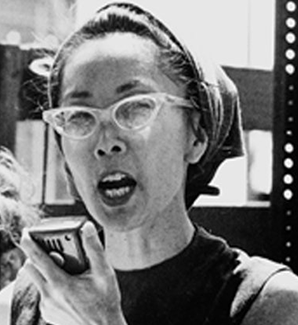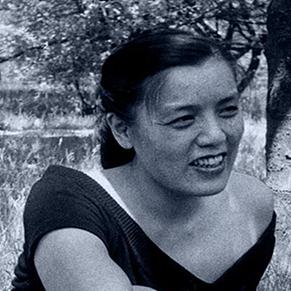AAPI Heritage Month: Yuri Kochiyama and Grace Lee Boggs
On our final Friday of #AAPIHeritageMonth, RHAP sheds light on a couple of the elders in the movement who have paved the way for future leaders to engage in civil liberties and human rights.
 Yuri Kochiyama was born in California in 1921, and was relocated along with over 100,000 Japanese Americans to internment camps after Pearl Harbor was attacked during World War II. Her political awakening began throughout her time there, and continued when she moved to New York City with her husband and became active with the Black and Puerto Rican community advocating for safer spaces.
Yuri Kochiyama was born in California in 1921, and was relocated along with over 100,000 Japanese Americans to internment camps after Pearl Harbor was attacked during World War II. Her political awakening began throughout her time there, and continued when she moved to New York City with her husband and became active with the Black and Puerto Rican community advocating for safer spaces.
Aligned with many African American activists ranging from Angela Davis, Amiri Baraka, and most famously, Malcolm X, Kochiyama’s activism branched out from reparations for Japanese internees, to include civil rights for African Americans, prison reform and rights for political prisoners, nuclear disarmament, the fight for Puerto Rican independence, and was very vocal against the Vietnam War.
Kochiyama, her husband Bill and other Japanese activists were influencers that led to the 1988 Civil Liberties Act, granting reparations and a formal apology to Japanese Americans interned during World War II, signed into law by President Reagan.
Yuri dedicated her life to this work and died peacefully at age 93 in 2014.
 Grace Lee Boggs was a first-generation Chinese American philosopher, social activist and feminist from Providence, RI who dedicated the majority of her life’s work in Detroit, MI. Boggs, along with her husband James, was a vocal advocate of civil, environmental, women and labor rights. A graduate of Barnard College, she obtained her PhD in philosophy at Bryn Mawr where she was influenced by the teachings of Kant, Hegel and Marx.
Grace Lee Boggs was a first-generation Chinese American philosopher, social activist and feminist from Providence, RI who dedicated the majority of her life’s work in Detroit, MI. Boggs, along with her husband James, was a vocal advocate of civil, environmental, women and labor rights. A graduate of Barnard College, she obtained her PhD in philosophy at Bryn Mawr where she was influenced by the teachings of Kant, Hegel and Marx.
An active member of the Black Power Movement of the 60s, with allies as prominent as Malcolm X, Boggs and her husband wanted to engage and revitalize the young people of Detroit in the same way that the youth were being mobilized during summers in Mississippi during the Civil Rights Movement. Through community gardens, the arts, health initiatives and education reform through charter schools, Boggs was able to see this reality come to fruition when “Detroit Summer” became a reality. “…I was one of the founders of a program…that attracted the attention of African American elders who saw the vacant lots as an opportunity to grow food for the community … [It] brought young people from the city and African American elders together. That created a fantastic urban agricultural movement, which is one the fastest growing and most vibrant in the county, redefining what it is to be free by growing our own food and feeding ourselves.” (from 2012’s Hyphen Magazine interview with Boggs by Momo Chang). Boggs passed away in 2015, at age 100, after over seven decades of tireless work.
RHAP thanks our readers for engaging with our blog throughout AAPI Heritage Month!
